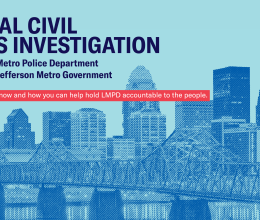
In April 2021, the Department of Justice launched an investigation into Louisville Metro Police Department (LMPD) and Louisville-Jefferson Metro Government and determined government officials routinely violate people’s constitutional rights.
Open the menus below to learn more, get involved, and help hold LMPD accountable to the people.
Click below to download a foldable wallet card so you share this information with friends and family.